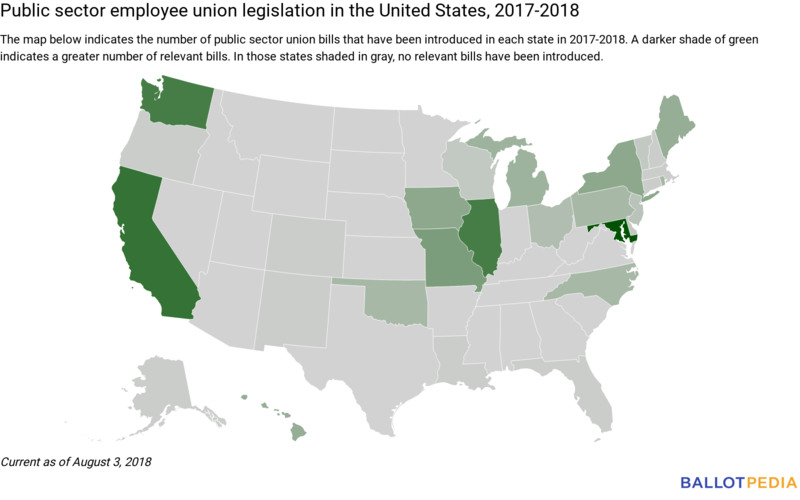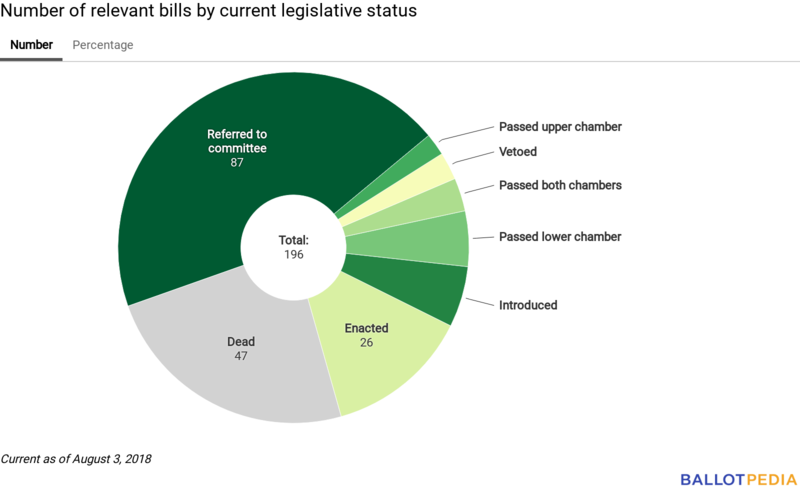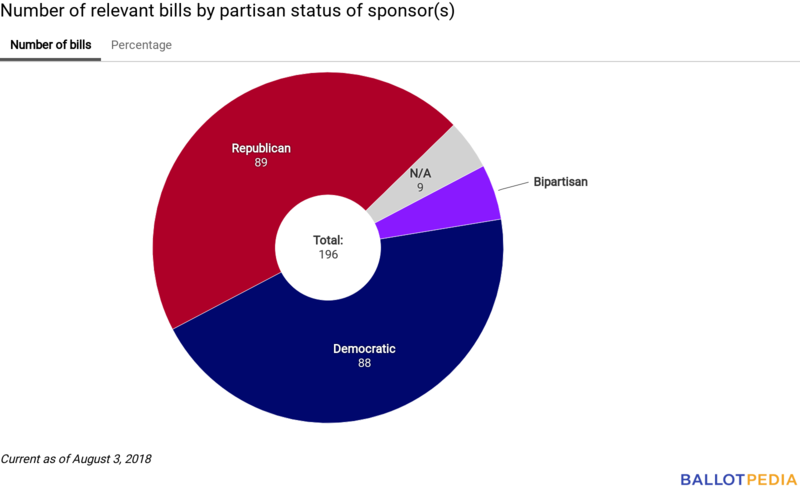Union Station: August 3, 2018
On June 27, the Supreme Court issued its 5-4 ruling in Janus v. American Federation of State, County, and Municipal Employees (Janus). The court ruled that public sector unions cannot require non-member employees to pay agency fees to cover the costs of non-political union activities. What kinds of bills have states enacted in anticipation of, and in response to, Janus? See below for a breakdown.
- As of today, 13 states have enacted 31 bills relating to public sector unions in 2017-2018 legislative sessions.
- In seven of these 13 states (California, Connecticut, Delaware, Hawaii, New Jersey, Rhode Island, and Washington), Democrats have majority control in both chambers of the state legislature and the governorship, making them Democratic trifectas.
- In three of these 13 states (Iowa, Missouri, and Oklahoma), Republicans have trifecta control of the state.
- In the remaining three states (Illinois, Maryland, and New York), control is divided between Democrats and Republicans.
- Of the 31 bills enacted, Ballotpedia has identified 15 that oppose the plaintiffs’ arguments in Janus (i.e., these bills’ common goal is extending the viability or influence of public sector unions). Ballotpedia has identified six bills that support the plaintiffs' arguments made in Janus. The stance of the remaining bills with respect to Janus is unclear.
- More information about the 15 bills that oppose Janus:
- These bills originated in nine states: California, Connecticut, Hawaii, Illinois, Maryland, New Jersey, New York, Rhode Island, and Washington. Democrats control the legislatures in eight of these states. In six of these states (California, Connecticut, Hawaii, New Jersey, Rhode Island, and Washington), Democrats control both the state legislatures and the governorships. In two of these states (Illinois and Maryland), Democrats control the legislatures but Republicans hold the governorships. In New York, Democrats hold the governorship and the state Assembly while Republicans control the Senate.
- More information about the six bills that support Janus:
- These bills originated in four states: Iowa, Missouri, Oklahoma, and Washington. In Iowa, Missouri, and Oklahoma, Republicans control the state legislatures and the governorship. In Washington, Democrats hold both the legislature and the governorship.
- More information about the 15 bills that oppose Janus:
- Of the 31 bills enacted, 26 were introduced as stand-alone legislation. The remaining five were appropriations bills that included provisions affecting public sector union policy.
- For more information on enacted public sector union legislation, see this article.
What we've been reading:
- New Jersey Law Journal, "What Does 'Janus' Mean for NJ and Its Public Union Membership?" Aug. 1, 2018
- Washington Examiner, "Unions predict victory in referendum to overturn Missouri's right-to-work law," Aug. 1, 2018
- Pennsylvania Watchdog, "Report: ‘Fair share' fees forced non-union workers in Pennsylvania to pay almost $9.7 million to unions in 2017," August 1, 2018
- The Pew Charitable Trusts, "Lawmakers in Blue States Try to Protect Organized Labor," Aug. 1, 2018
- Governing, "First Refund of Union Fees Issued Since Janus Ruling," July 31, 2018
The big picture
Number of relevant bills by state
As of August 3, 2018, we are tracking 196 pieces of legislation dealing with public sector employee union policy. No new bills were added this week. On the map below, a darker shade of green indicates a greater number of relevant bills. Click the map for complete information.
Number of relevant bills by current legislative status
Number of relevant bills by partisan status of sponsor(s)
Recent legislative actions
Only one state legislature (California) took action on a relevant bill in the past week.
- California SB1085: This bill would require public employers to grant leaves of absence without loss of pay or benefits to employees who serve as stewards or officers of an employee organization.
- The bill is scheduled to be considered at an Assembly Appropriations Committee hearing Aug. 8. The bill has already cleared the state Senate.
See also
| |||||||||||||||||||||||





